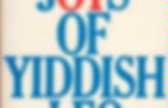

Speaking Mameloshn | Blake Eskin. YIDDISH: A Nation of Words, by Miriam Weinstein. Steerforth, 303 pp., $26. THE NEW JOYS OF YIDDISH, by Leo Rosten. Revised by Lawrence Bush. Crown, 458 pp., $35. Newsday, October 22, 2001 IN THE PREFACE to “The Joys of Yiddish,” Leo Rosten wrote, “Never in history has Yiddish been so influential – among gentiles. (Among Jews, alas, the tongue is running dry.)” Meanwhile, Yiddish is still running dry among those who can claim it as their own. Yiddish has been dealt blows from the internal and external pressures of assimilation in America, Soviet anti-Semitism and the hostility of Israelis and other Zionists, but most devastating was the Holocaust, which wiped out half of the world’s 11 million Yiddish speakers. There is undoubtedly a Yiddish aphorism befitting the ironic happenstance reported in the previous sentence, and if I were Miriam Weinstein, I would use it. Which brings us back to the late Leo Rosten, whose tome of popular lexicography has just been revised and reissued.
NUMBERED - Trailer. I Don’t Know Arabic, but I do. And yet don’t. Watching an Arabic movie every Friday throughout my childhood. Nearly 30 years would pass before I discover that my grandmother and Farid al-Atrash were friends. I have no idea, it goes under my radar. And yet they are there, the words. By Tamar Kaplansky (Translated from Hebrew by Orna Meir-Stacey) I don’t know Arabic. My mother grew up in Alexandria, my father still has a Palestinian identity card. Watching an Arabic movie every Friday throughout my childhood. I also did not learn Arabic, except for one year in fifth grade before we went to France, with Shoshi, the teacher.
I mean, except after a few days in the Sinai, when suddenly I discover that I can compose sentences. Or when I hear Umm Kulthum for the first time, and discover that something about it is totally clear to me. Don’t know Arabic but I do. From the left: My grandmother Becky Memran (formerly Rouvio), with Farid al-Atrash, and her sister Léonie. Don’t know even though Arabic has always been there. The Joys of Yiddish Dictionaries, Ezra Glinter. One of the best things I’ve ordered on the Internet recently is a Yiddish translation of The Hobbit. After getting lost in the mail in the wake of Hurricane Sandy, it finally arrived: a medium-sized white-on-black paperback titled Der Hobit, with a dedication to the “workers and residents of the Newtonville Starbucks (my office).” The translator, Barry Goldstein, is a retired computer programmer, and reworking The Hobbit is only one of his hobbies. He is an arctic traveler who has taken several trips to Greenland, and he has rendered accounts of Shackleton’s voyages into Yiddish.
He is also on the editorial team of a more momentous, if not quite as whimsical, project: the new Comprehensive Yiddish-English Dictionary, released in January by Indiana University Press. Now, thanks to Goldstein, I have the Yiddish Hobbit, and the means to read it. When the first Eastern European Jews arrived in the United States, they had no Yiddish-English dictionaries of any kind. Birobidjan Dans l’Etat yiddish de Staline. Ziama Mikhaïlovitch Geffen a 92 ans. Il s’appuie lourdement sur une canne en montrant sa basse-cour et un chapelet de chèvres. « Elles comprennent le yiddish !
» dit-il en rigolant. Son œil bleu s’anime quand il se remémore son arrivée dans la région. C’était tout au début, dans les années 1930. Il avait 11 ans. « Il n’y avait rien ici, dit-il, rien que la taïga. Nous avons tout fait. Qui connaît le Birobidjan, cette République autonome juive sur le fleuve Amour, face à la Chine ? La gare de Birobidjan est une bâtisse en brique rouge et, sur le fronton, bien en vue, l’enseigne en russe et en yiddish : Birobidjan. Combien sont restés à Birobidjan, dans cette ville de 77 000 habitants ? Staline commence à trouver ses amis juifs trop voyants.
Les autorités y expédient des milliers de familles juives ; Staline prévoyait 100 000 personnes. Bientôt, les purges staliniennes freinent cet élan. Ce monde vibre encore comme l’écho lointain d’une civilisation blessée Birobidjan donc.